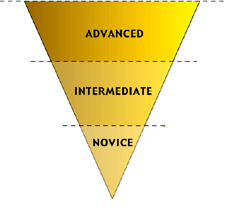TEKS for LOTE Progress Checkpoints
Progress Checkpoints describe in general terms what language students should know and be able to do at critical points along the path to proficiency. While advancing students may demonstrate varying abilities in specific language skills, their overall proficiency usually follows a progression from Novice, through Intermediate, to Advanced. Progress Checkpoint descriptions can be used in the design of class activities and assessment by providing a broad focus for the evaluation of students' work as they progress along the language learning continuum.
 |
|
Click to learn
more
|
An inverted triangle is often used to show that as students advance their proficiency, the amount of time and practice needed to reach the next Progress Checkpoint increases. A student can move relatively quickly through the early stage of mimicking memorized words and phrases—a stage that is limited, controlled, and comfortable. However, longer periods of practice and an increasingly meaningful volume of experiences are necessary to move into later stages of development characterized by flexible, challenging, and creative use of language.
It is important to understand that linguistic skills are not developed in a strictly linear progression. Temporary fluctuations in accuracy normally accompany increases in overall proficiency. Novices, for example, may repeat memorized phrases with nearly perfect grammar and pronunciation. But as they begin to combine these learned phrases in an effort to communicate more creatively, accuracy temporarily declines. Guided practice over time helps students integrate skills as they gain confidence and fluency in different language functions. This includes their ability to communicate and behave in culturally appropriate ways. The overall goal is to gradually mesh cultural and linguistic skills with increasing accuracy in order to obtain a comprehensively high level of language proficiency.
Progress Checkpoint Descriptions
Keep in mind that these provide only a general means
for measuring overall proficiency. More specific performance
expectations are outlined in the TEKS for LOTE Program
Goals. (For an adaptation of Progress Checkpoints for
classical languages, see Appendix D of
A Texas Framework for Languages
Other Than English).
Novice Level — Using age-appropriate activities, students develop the ability to perform the tasks of the novice language learner. The novice language learner, when dealing with familiar topics, should:
- understand short utterances when listening and respond orally with learned material;
- produce learned words, phrases, and sentences when speaking and writing;
- detect main ideas in familiar material when listening and reading;
- make lists, copy accurately, and write from dictation;
- recognize the importance of communicating in a culturally appropriate manner; and
- recognize the importance of acquiring accuracy of expression by knowing the components of language, including grammar.
Intermediate Level — Using age-appropriate activities, students expand their ability to perform novice tasks and develop their ability to perform the task of the intermediate language learner. The intermediate language learner, when dealing with everyday topics, should:
- participate in simple face-to-face communication;
- create statements and questions to communicate independently when speaking and writing;
- understand main ideas and some details of material on familiar topics when listening and reading;
- understand simple statements and questions when listening and reading;
- meet limited practical and social writing needs;
- use knowledge of the culture in the development of communication skills;
- use knowledge of the components of language, including grammar, to increase accuracy of expression; and
- cope successfully in straightforward social and survival situations.
Advanced Level — Using age-appropriate activities, students master novice tasks, expand their ability to perform intermediate tasks, and develop their ability to perform the tasks of the advanced language learner. The advanced language learner, when dealing with events of the concrete world, should:
- participate fully in casual conversations in culturally appropriate ways;
- explain, narrate, and describe in past, present, and future time when speaking and writing;
- understand main ideas and most details of material on a variety of topics when listening and reading;
- write coherent paragraphs;
- cope successfully in problematic social and survival situations;
- achieve an acceptable level of accuracy of expression by using knowledge of language components, including grammar; and
- apply knowledge of culture when communicating.

